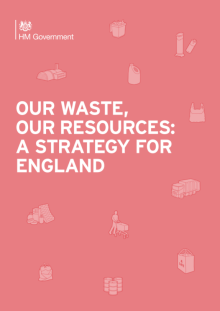Our waste, our resources: a strategy for England
On 18 December 2018, the Department for Environment, Food & Rural Affairs (DEFRA) and the Environment Agency (EA) launched Our Waste, Our Resources a Strategy for England, a resources and waste strategy to overhaul England’s waste system, putting a legal onus on those responsible for producing waste or items that are harder or more costly to recycle including cars, electrical goods, and batteries.
This is the first comprehensive update to the waste strategy in more than a decade, intended to eliminate avoidable plastic waste and improve the environment.
Householders will see the existing recycling system simplified, with plans for a consistent approach to recycling across England. This will ensure weekly collections of food waste, subject to a consultation which will also consider introducing free garden waste collections.
The government will introduce a consistent set of recyclable material for collection, subject to consultation, funded by industry through Extended Producer Responsibility (EPR), which will see industry pay higher fees if their products are harder to reuse, repair or recycle. EPR for packaging will raise between £500 million and £1 billion a year for recycling and disposal.
Other measures may also include:
- A deposit return scheme to increase the recycling of single-use drinks containers including bottles, cans and disposable cups filled at the point of sale.
- Mandatory guarantees and extended warranties on products to encourage manufacturers to design products that last longer and drive up the levels of repair and re-use.
- Annual reporting on food surplus and waste by food businesses.
- A clamp-down on the illegal movement of waste by introducing compulsory electronic tracking and tougher penalties for rogue operators.
Launching the strategy at Veolia’s recycling centre in London, Environment Secretary Michael Gove said; “Our strategy sets out how we will go further and faster, to reduce, reuse, and recycle. Together we can move away from being a ‘throw-away’ society, to one that looks at waste as a valuable resource. We will cut our reliance on single-use plastics, end confusion over household recycling, tackle the problem of packaging by making polluters pay, and end the economic, environmental and moral scandal that is food waste.”
Richard Kirkman, Veolia’s Chief Technology and Innovation Officer, said; “...these steps have the clear potential to dramatically change the way the sector operates to increase recycling and recovery rates… It’s the direction we have been hoping and waiting for, and with the public and businesses playing their part the UK can build a sustainable future.”
Anna Surgenor, Senior Sustainability Advisor and Circular Economy programme lead at UKGBC said; "UKGBC is already working with Defra and BEIS in this area and we're committed to continuing engagement with them as part of our Circular Economy programme. Construction, demolition and excavation in the UK currently produces a staggering 120 million tonnes of waste each year. This is nearly 60% of all UK waste. There is evidently a huge opportunity for the sector to improve and we support Defra's work with the Green Construction Board to establish a definition of zero avoidable waste in the sector."
You can see the strategy at: https://assets.publishing.service.gov.uk/government/uploads/system/uploads/attachment_data/file/765625/resources-waste-strategy-dec-2018.pdf
The next day, the government published draft clauses for a proposed Environment Bill.
[edit] Related articles on Designing Buildings Wiki
- Circular economy.
- Composting.
- Construction waste.
- Definition of waste: Code of practice.
- Deleterious materials.
- Delivering waste efficiency in commercial buildings: A guide for facilities managers.
- Disposal.
- Environment Bill 2020.
- Fly-tipping.
- Hazardous substances.
- Landfill tax.
- Materials Management Plan (MMP).
- ReCon Soil project.
- Recycling.
- Site clearance.
- Site waste management plan.
- Waste and Resources Action Programme WRAP.
- Waste management - explained.
- Waste management process.
About the wiki
You can use and contribute to the wiki in different ways.
[edit] Engaging with the wiki
You can:
- Contribute to existing articles
- Create articles
- Share articles through social media and other channels
[edit] Add your own content
To contribute to or create an article, you can follow these steps:
- Register as a user
- Read through the editorial policy and guidance on writing and contributing to articles
- See the detailed help page on tips on writing wiki articles
- Try editing a test article
- If editing an article, select 'Edit this article' underneath the article title
- If creating a new article, select 'Create an article'. In the 'Select categories' area, expand the 'Industry context' list and tag 'Circular economy' to add your article to this wiki
[edit] Who is this wiki for?
The articles contain information on implementing circular economy approaches in construction that could be relevant to:
- Architects
- Construction contractors
- Designers
- Developers, owners, investors
- Engineers
- Landowners
- Manufacturers and supplier
- Universities and research
- Urban planners






